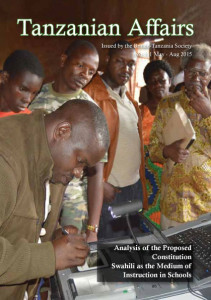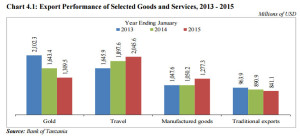by Abdul Paliwala
The recent seminar arranged by BTS and the School of Oriental and African Studies (SOAS) on the proposed constitution for Tanzania included four very enlightening presentations. Unfortunately, we do not have space here for all four, but we are delighted to be able to include this one. Abdul Paliwala is Emeritus Professor of Law at the University of Warwick; He is also currently Visiting Professor of Law at Birkbeck (University of London).
The purpose of a Constitution is to serve and to promote the wellbeing of the people of a nation. In particular, it is intended to provide an element of peace and personal security for law-abiding citizens. It is intended to provide for citizens a solid foundation on the basis of which they can organise their lives knowing (or believing) that the things they most value will be safeguarded, and the things they most fear will not take place. In order to fulfil that function however, the constitution has to uphold, to strengthen and support the unity of the nation regardless of any internal distribution of power between groups or regions. It should be their conscious declaration of themselves as a unity. It should be their collective, “I am”, a deliberate assertion by the group that is united in a common citizenship and with duties and rights to and from each other in that capacity. Julius Nyerere
Mwalimu Nyerere was here emphasising the idea of universal acceptance and legitimacy, which is the hallmark of the most enduring constitutions.
Constitutional lawyers increasingly suggest that the Constitution is not a document but a process, and that constitutions have to be ‘built’ to last. This building involves the process of making a new constitution, the process of its enactment and the continual process of ensuring that the entire nation now and in the future continues to accept it as a collective ‘I am’. This paper therefore deals briefly with these three aspects of Constitutional Building.
It is not my intention to lay any blame on any side, but it is sad that the Tanzanian constitutional review process, which started so well, faces severe challenges today. The very nature of those challenges, with parties walking out, puts in jeopardy the notion of a ‘conscious declaration of unity, the collective I am’ that Mwalimu talked about.
The Constitutional Process
Tanzania established a Constitutional Review Committee composed of equal representation from Tanzania Mainland and Zanzibar and containing eminent persons including as chair the former Prime Minister Joseph Warioba. The Committee carried out a wide consultation at the end of which it produced the first draft constitution in June 2013. This was again the basis of further consultation at the end of which was produced the 2nd draft in September. This draft was substantially revised by the Constituent Assembly and approved by 2/3 majority votes of members from each part of the Union. However, this was partly because the opposition walked out! They felt that the Government side was dominating the proceedings.
The Constitutional Review Act requires a referendum to approve the Constitution with a simple majority vote in each part of the Union. At one stage it was announced that this would be postponed until after the general election. However in October 2014 the President announced that the referendum will now take place in April 2015.
The confusion, opposition walk-out, delays and limited time for proper information and deliberation on the referendum means that the Constitutional Review process has been problematic!
The Constitutional Drafts
The Second Aspect of Building a Constitution is the Document itself. How robust is it? It is therefore necessary to compare the drafts prepared by the Constitutional Review Commission (CRC) and the proposal approved by the Constituent Assembly (CA).
This section deals with four key aspects of the drafts and proposals. These include the Union, Presidential powers in relation to other institutions of governance, accountability and fundamental objectives and human rights.
The Union
What is the authority of the Union Government over Zanzibar? The CRC proposed a 3 government structure including a government for Tanzania mainland, for Zanzibar and the Union Government. Each would have clear competence in relation to its assigned matters, so that Union laws could not override Zanzibar laws in areas of their competence. However, this proposal was rejected by the CA and its proposed constitution provides essentially for the retention of the existing two government structure. Zanzibar is responsible for certain areas and the Union Government responsible for Union and Tanzania mainland affairs.
The Union in 1964 was based on the Agreement between the two governments which was incorporated into the Acts of Union. This was essentially preserved in the 1977 Constitution and continues to form the basis of the Union and can be said to be the Fundamental Law of the Union. The CRC preserved this status under Article 1 (3); so does the CA. Yet at various points both drafts seem to refer to matters which under the Constitution come under Zanzibar authority. Does it mean that where there is a conflict the Acts of Union will prevail?
What are the areas of competence? The current Constitution provides for 22 matters as Union matters. The CRC reduced this to 7. The National Assembly Proposed Constitution provides for 14.
What are the limitations on competence of Zanzibar to decide its own affairs? There has been resentment in Zanzibar about a number of areas -including the budgetary, financial and taxation relationship. Another area has been the ability of Zanzibar to make agreements at international level, in particular, the controversy over whether Zanzibar could become a member of the Organisation of Islamic Countries.
The CRC provided for the establishment of a Commission for Coordination of Relations between the three Governments consisting of five members. This would be chaired by the Vice President and include the Presidents of Zanzibar and the Mainland governments as well as Resident Ministers from Zanzibar and the Mainland and the Union Foreign Minister. It provided that in all matters, the Commission should observe the principle of equality in the provision of services in Zanzibar and the Mainland and the principle of ‘proportionality’ in matters of allocation.
The CA also provides for a Coordination Commission with similar membership. In addition, Article 252 of the CA proposal provides for a Joint Finance Commission of the Union and Zanzibar Governments consisting of 4 members from the mainland and 3 from Zanzibar appointed by the President after consultation with the President of Zanzibar. The Finance Commission would work on principles of allocation of finances in the country. However, neither the Coordination Commission nor the Finance Commission are required to observe the principles of proportionality indicated in the CRC drafts, with the assumption that these will be worked out on a mutual basis.
The CRC was concerned to give stronger powers to the Coordination Commission and used the words ‘special responsibility for ensuring’, whereas the CA Proposal uses less mandatory language ‘a special role to facilitate’. More significantly, the CRC provided for appeal to the Supreme Court in case of conflict in relation to issues. This recourse to the Supreme Court is removed in the CA proposal. Therefore the CA is tending to provide a facilitative rather than decisive role for the coordination process.
Both the CRC and CA Drafts provide that Zanzibar can borrow internationally with the cooperation of the Union Government. In addition they provide that Zanzibar can enter into agreements with international agencies and organisations, again with the co-operation of the Union government. However the CA proposal provides that the National Assembly may enact legislation to control any such agreements thus potentially limiting the power.
In relation to the judiciary, the CRC proposed a hierarchy with the Apex Court being the Supreme Court of the Union, A Union Court of Appeal which could hear appeals from both parts of the Union, and separate High Courts for the Mainland and Zanzibar. In particular, the Zanzibar court would exercise jurisdiction in accordance with the Zanzibar Constitution. The Two Government solution of the CA has meant that while the Supreme Court and the Court of Appeal have been retained, there is a High Court of the United Republic which can deal with all matters including union and Tanzania Mainland matters which are not specifically assigned to another court, for example the High Court of Zanzibar. However, Article 199 (2) provides parallel jurisdiction to the High Court of Zanzibar in relation to any law made by the union Parliament which applies to both Zanzibar and the mainland.
In relation to Parliament, the CRC Draft Article 113 proposed a small union Parliament with a maximum of 75 members. This reflected the limited Union powers under the three government system. More specifically, it divided the numbers for the Union Parliament for Zanzibar and the Mainland with 20 members from Zanzibar and 50 from the Mainland. The CA Proposal has increased to a minimum of 340 and a maximum to 390 members. More specifically in relation to the Union, it does not specify any ratio between Zanzibar and the Mainland, presumably leaving it to the Electoral Commission, with the result that the principles of Zanzibar representation in Parliament are not clear. To some extent this is to cater for the fact that the Parliament, as now, will continue to be responsible for Mainland as well as Union affairs, but it also suggests that Parliamentarians who were dominant members of the CA did not wish for their status to be diminished and their jobs to end!
Presidential Powers in Relation to Other Institutions
The issue of the power of the president is recognised by constitutionalists as a key issue of democratic governance. The CRC drafts tried to limit presidential power in several ways. In particular, they provided that key Presidential appointments should be made upon advice by relevant bodies such as independent appointment committees and that they should be subject to confirmation by Parliament in a system similar to that in the United States and that appointments for example to the senior judiciary should be made by the President from names submitted to the President. Furthermore, the authority to make lesser public appointments was given to the Secretariat of the Public Service and to relevant other independent bodies such as the Judicial Services Commission or the Appointment Committee for the Electoral Commission. The CA proposal removes the need for confirmation by the National Assembly. The principle of independent nomination committees for specific appointments such as to higher judiciary and the chairs of the Electoral Commission and Human Rights Commission is retained; however, there is a requirement to submit three names for the judiciary, a number of names for the Electoral Commission and Public Ethics Commission but no such obligation in relation to the Public Service Commission.
The CA proposal also makes a significant change in relation to assent to legislation proposed by the National Assembly. The CRC Draft provided that the President may refuse to assent to a Bill. If the Bill is represented to the President in 6 months, then the President would have to approve it. Similar provisions are retained in the CA Proposal; however, if the President still does not approve of the Bill as represented, then the President may dissolve Parliament. The power to dissolve becomes a threat to the careers of the Parliamentarians, who would be fearful of losing their seats!
Accountability
Both drafts provide for accountability of public leaders in relation to their property and assets, foreign bank accounts and participation in business. However, while the CRC was clearly concerned about the accountability of Public Leaders and their Drafts categorically proposed a strong leadership code in the Constitution with an obligation to declare property and debts, the CA Proposal only provides a general framework for an ethics code, leaving the actual system to Parliament to decide upon. Thus, in relation to foreign bank accounts, while the CRC Draft provided prohibition of foreign bank accounts except as provided by law, the CA Proposal does not prohibit but provides that Parliament will enact legislation for the regulation of conduct of public leaders. There is a similar difference between the CRC and CA Drafts in relation to participation in business. While the CA Proposal provides for greater flexibility, there is an obvious concern that the party in power may use its majority to provide for weak proposals.
Fundamental Objectives and Human Rights
The CRC Draft was remarkable for its substantive and interesting scheme of Fundamental Objectives, Directive Principles and National Policies as well as human rights to be protected by a Human Rights Commission and recourse to courts. Chapter Two on Fundamental Objectives, Directive Principles and National Policies is mainly concerned with duties of state institutions. The basic principle is that the Constitution and state institutions and every citizen should protect democracy, good governance, human rights and social and economic development including prevention of exploitation and the relief of poverty. Article 11 (2) provided an obligation on the government to report to Parliament once a year in relation to the fulfilment of these obligations. The issue as to whether any of these duties were justiciable in a court of law was left open, with the assumption being that courts like all institutions would give particular attention to these principles in their interpretation of law.
The Constitutional Assembly Draft also provides in Chapter 2 for Fundamental Objectives, Directive Principles and National Policies which emphasise democracy and good governance. While many of the provisions are similar, there is a greater emphasis on principles of economic development and no mention of prevention of exploitation or relief of poverty. More significantly, there is no obligation to report to Parliament and Article 20 (2) specifically states that the chapter provisions are not enforceable in any court.
Unlike the Fundamental Objectives and National Policy, both the CRC and the CA provide for an extensive set of human rights which can be enforced in the courts of law. The emphasis is on civil and political rights such as freedom and equality, life, non-discrimination, non-enslavement, personal freedom, privacy, movement, expression, information and mass media, religion, association, participation in public affairs, work, of employees and employers, to own property, citizenship, of accused and prisoners, to clean and safe environment and to education and learning. Specific categories of people such as children, youths, the disabled, women, the elderly and minority groups such as hunter-gatherers have specific rights.
Of particular significance was the equal right of women to own land and of equal membership of parliament with a proposal that each constituency would have one male and one female member, although no provision was made in relation to other state offices.
Another remarkable proposal was that enforcement of rights can be on behalf of a group rather than on an individual basis. However, there was no specific provision for public interest litigation. That is, an ordinary citizen who was interested in protecting the constitutional principles, but who did not have a claim for abuse of his or his group’s own rights could not bring an action. In India, South Africa and more recently Kenya, the principle of Public Interest Litigation has become an important method of protecting constitutional rights on behalf of citizens.
The CRC rights were also subject to duties of citizens and state institutions including the duty to protect the constitution, national values, culture, traditions, environment and human rights and to work. Significantly, in the interpretation of human rights the courts have also to take into account these duties and the interest of society in general. These rights can be restricted by legislation provided it observed the principles of democracy, transparency, dignity, equality and freedom and indicated clear reasons for doing so.
The CA Proposals have in the main retained these specific set of rights, but made significant changes in the provision. Most significantly, while the principle of equal number of male and female members of Parliament is retained, it is left to Parliament to determine the specific form this should take. A significant new provision in the CA Proposal is in relation to land. Specifically it provides that only citizens have right to own land. However, while this appears to be a dramatic provision, its significance is reduced by a provision that non-citizens can invest in land owned either by the State or other Tanzanians. In principle, this would not make significant change to existing practice under which most investment by foreigners has been on the basis of leases, either from the State or from private owners.
While the human rights provisions are significant, the key issue is whether they will make a substantive difference to the lives of ordinary Tanzanians. In this regard it may be that an opportunity was missed by both the CRC and the CA to provide significant social economic rights as in the South African constitution, which provides for example for rights to land, water and health. Secondly, as indicated above, while rights are justiciable and innovatively may be claimed on behalf of groups, the opportunity has been missed to introduce Public Interest Litigation.
Finally, while the CA Proposal appears to provide for a strong set of Fundamental Objectives, most of these are merely urging the state to make provision, and the actual obligation appears to be weak. Furthermore, the system of rights is balanced by a system of responsibilities of citizens. On the surface this sounds appropriate, but a key problem of balance between rights and responsibilities is that responsibilities provide instruments to the judiciary to weaken the actual implementation of the system of rights if responsibilities are interpreted as the interest of the state. Thus it requires a rights conscious judiciary, rather than a judiciary which is habituated into upholding state interest.
Implementation and Education of Citizens
The notion that the constitutional process and the contents of the Constitution are only two parts of the exercise of ‘building’ constitutions means that the ultimate fulfilment of the Constitution’s promise of a unified national consciousness requires two further elements: careful attention to the system of implementation and equally careful attention to constitutional education to ensure that each citizen is aware of the rights and responsibilities and promises of democratic good governance under the Constitution, to such an extent that each citizen feels that she or he owns it.
Firstly, how effective are the provisions for implementation in the Constitution? It is in relation to implementation that the various aspects of distribution of powers become significant. In particular, how powerful are the President and her/his Executive in relation to Parliament, the judiciary, organisations of supervision such as the Human Rights and other bodies? How powerful are all organs of government in relation to people? How can people assert the rights which are provided for in the Constitution? What are the forms of participation provided for citizens in the actualities of national and local governance? Is all they have is a right to vote once every few years?
In particular, what is the peoples’ awareness of the provisions of the Constitution and their rights and responsibilities? To the extent that the Constitution remains a document for the national leadership, and remote from the people, its finest words cannot really mean anything to the people to whom it is supposed to belong. Both the CRC and CA drafts make it a responsibility of all state institutions and citizens to uphold the constitution and national values and provision is made for all school curricula to include the education of citizens. Article 34 of the CRC draft and Article 43 of the CA proposal provide specifically for a right of citizens to participate in the governance of the country and decisions which may affect them, but this has to be in accordance with law.
The CRC and the CA make the Electoral Commission responsible for the education of voters and additionally provides that it shall be responsible for the education of citizens in relation to the ethics and accountability of leaders. Both the CRC and the CA make it a duty of the Human Rights Commission to educate the public in human rights and good governance. Therefore educational provisions may be crucial to enable people to participate effectively in their governance and to ensure that the fine words and promises will be implemented. In this respect, while both the CRC and the CA make provision for citizen education, much will depend on their effective implementation. That is, how strong is the Parliamentary legislation? What resources are provided for effective implementation?
Conclusion
We commenced with Mwalimu’s notion that a Constitution should be a conscious declaration by Tanzanians of their unity – a collective “I am”. If the Constitutional process is inclusive with full consultation of all the people, and the resultant constitution is one which promotes a feeling of unity, then it may provide a case for saying “I am”.
The real difficulty with the Constitutional process has been that it has failed to promote a sense of national unity. In relation to the content of the Constitution, it may be possible to argue either way on two or three governments. The real issue is that it has led to a divisive feeling. Similarly there is a feeling that the careful attempt by the CRC to control the powers of the President and systems of accountability has been diluted.
What is to be the future of the process? Whatever the result of the referendum, there is an inevitable dual reality involved in all constitution making. The construction of a constitution is a deeply political process and inevitably reflects the political realities of the day. At the same time, its sustainability depends on convincing the people that it belongs to them. In this respect, the constitutional developments in Kenya are instructive. The disaffection with the constitutional process ultimately led to a solution which is regarded as a fine constitution, but a feeling that there has to be a continuous struggle for effective implementation. In this respect it remains to be seen whether the Tanzanian constitutional process will lead to an enduring constitution or become a signpost in a continuing struggle for a feeling of ‘I am’.




